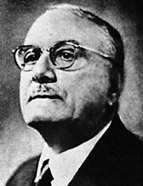

António Sérgio came from a liberal aristocratic family and both his father and grandfathers had been sailors and overseas governors. He was a student at the Colégio Militar and the Escola Politécnica de Lisboa later moving to the Naval School. He became an officer in the Navy and maintained a neutral political position between the monarchy and the republic. However, he resigned from the service following the 5 October 1910 Revolution. As he had to make a living, he worked for Portuguese and Brazilian publishing houses but also studied psychology and pedagogy in Geneva with Claparède. A writer and the first to use the “essay” genre in Portugal, he was a notable figure in various fields of knowledge ranging from economics to philosophy, literature to history. He failed in his application to become an Assistant at the Faculty of Letters of the University of Lisbon in 1912 – indeed he never taught in Portuguese universities. He was Minister for Public Education (Ministro da Instrução) in 1923-24, a resistance fighter opposed to the Military Dictatorship and a conspirator against the Estado Novo. As a result he was imprisoned and also exiled on two occasions. He ran various publications for Renascença Portuguesa (Portuguese Renaissance), collaborated on Águia, Pela Grei (which he edited), Lusitania, Revista de Estudos Portugueses and later Seara Nova, which he also edited.
António Sérgio wanted to be an educator and social reformer; however, he opted to study history because “to write history is a way to free ourselves from the past”, an expression taken from Goethe whom he frequently cites. He never said he was nor did he see himself as a historian although he always wrote about history and advanced some working hypotheses which had a decisive influence on his contemporaries. Supported by the work of Oliveira Martins, in 1913 he already considered that two major facts stood out in the study of the peninsula’s slide into decadence, facts that could be considered fundamental: “the warrior education and purification; or, in other words, the lack of any productive activity (agriculture, manufacturing) and systematic isolation” (O problema da cultura…, 1914 [The Problem of Culture]). This was a stance he would maintain.
For Sérgio, the concept of the nation’s past was always filtered through a critical view of the structure of the State and especially through highlighting the negative role the dominant social groups played. In the beginning the nobility, then the bacharéis (university graduates) and the wealthy bourgeoisie were indicated as taking advantage of the nation’s riches and scorning productive work. “In Portugal, the nobility (essentially knights as they were educated to carry out permanent forays against the Moor) far from accompanying and managing productive work exhausted the land and industries with parasitic serfdom (...) From time to time the monarch tried to alter this situation by introducing agrarian laws but nothing came of it. Thus, those who should have worked the land abandoned it and the rural exodus directed people’s energies towards the maritime trade, a trade towards which the geographical situation of the country and later the economic needs of northern Europe in fact pushed us.”
